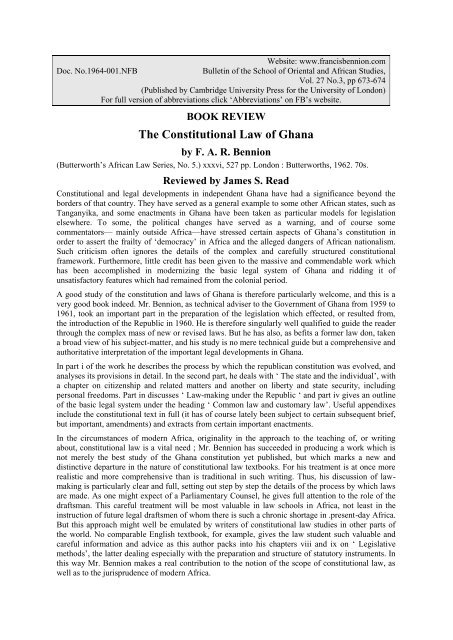The Constitutional Law of Ghana - Francis Bennion
The Constitutional Law of Ghana - Francis Bennion
The Constitutional Law of Ghana - Francis Bennion
Create successful ePaper yourself
Turn your PDF publications into a flip-book with our unique Google optimized e-Paper software.
Website: www.francisbennion.comDoc. No.1964-001.NFBBulletin <strong>of</strong> the School <strong>of</strong> Oriental and African Studies,Vol. 27 No.3, pp 673-674(Published by Cambridge University Press for the University <strong>of</strong> London)For full version <strong>of</strong> abbreviations click ‘Abbreviations’ on FB’s website.BOOK REVIEW<strong>The</strong> <strong>Constitutional</strong> <strong>Law</strong> <strong>of</strong> <strong>Ghana</strong>by F. A. R. <strong>Bennion</strong>(Butterworth’s African <strong>Law</strong> Series, No. 5.) xxxvi, 527 pp. London : Butterworths, 1962. 70s.Reviewed by James S. Read<strong>Constitutional</strong> and legal developments in independent <strong>Ghana</strong> have had a significance beyond theborders <strong>of</strong> that country. <strong>The</strong>y have served as a general example to some other African states, such asTanganyika, and some enactments in <strong>Ghana</strong> have been taken as particular models for legislationelsewhere. To some, the political changes have served as a warning, and <strong>of</strong> course somecommentators— mainly outside Africa—have stressed certain aspects <strong>of</strong> <strong>Ghana</strong>’s constitution inorder to assert the frailty <strong>of</strong> ‘democracy’ in Africa and the alleged dangers <strong>of</strong> African nationalism.Such criticism <strong>of</strong>ten ignores the details <strong>of</strong> the complex and carefully structured constitutionalframework. Furthermore, little credit has been given to the massive and commendable work whichhas been accomplished in modernizing the basic legal system <strong>of</strong> <strong>Ghana</strong> and ridding it <strong>of</strong>unsatisfactory features which had remained from the colonial period.A good study <strong>of</strong> the constitution and laws <strong>of</strong> <strong>Ghana</strong> is therefore particularly welcome, and this is avery good book indeed. Mr. <strong>Bennion</strong>, as technical adviser to the Government <strong>of</strong> <strong>Ghana</strong> from 1959 to1961, took an important part in the preparation <strong>of</strong> the legislation which effected, or resulted from,the introduction <strong>of</strong> the Republic in 1960. He is therefore singularly well qualified to guide the readerthrough the complex mass <strong>of</strong> new or revised laws. But he has also, as befits a former law don, takena broad view <strong>of</strong> his subject-matter, and his study is no mere technical guide but a comprehensive andauthoritative interpretation <strong>of</strong> the important legal developments in <strong>Ghana</strong>.In part i <strong>of</strong> the work he describes the process by which the republican constitution was evolved, andanalyses its provisions in detail. In the second part, he deals with ‘ <strong>The</strong> state and the individual’, witha chapter on citizenship and related matters and another on liberty and state security, includingpersonal freedoms. Part in discusses ‘ <strong>Law</strong>-making under the Republic ‘ and part iv gives an outline<strong>of</strong> the basic legal system under the heading ‘ Common law and customary law’. Useful appendixesinclude the constitutional text in full (it has <strong>of</strong> course lately been subject to certain subsequent brief,but important, amendments) and extracts from certain important enactments.In the circumstances <strong>of</strong> modern Africa, originality in the approach to the teaching <strong>of</strong>, or writingabout, constitutional law is a vital need ; Mr. <strong>Bennion</strong> has succeeded in producing a work which isnot merely the best study <strong>of</strong> the <strong>Ghana</strong> constitution yet published, but which marks a new anddistinctive departure in the nature <strong>of</strong> constitutional law textbooks. For his treatment is at once morerealistic and more comprehensive than is traditional in such writing. Thus, his discussion <strong>of</strong> lawmakingis particularly clear and full, setting out step by step the details <strong>of</strong> the process by which lawsare made. As one might expect <strong>of</strong> a Parliamentary Counsel, he gives full attention to the role <strong>of</strong> thedraftsman. This careful treatment will be most valuable in law schools in Africa, not least in theinstruction <strong>of</strong> future legal draftsmen <strong>of</strong> whom there is such a chronic shortage in .present-day Africa.But this approach might well be emulated by writers <strong>of</strong> constitutional law studies in other parts <strong>of</strong>the world. No comparable English textbook, for example, gives the law student such valuable andcareful information and advice as this author packs into his chapters viii and ix on ‘ Legislativemethods’, the latter dealing especially with the preparation and structure <strong>of</strong> statutory instruments. Inthis way Mr. <strong>Bennion</strong> makes a real contribution to the notion <strong>of</strong> the scope <strong>of</strong> constitutional law, aswell as to the jurisprudence <strong>of</strong> modern Africa.
Other parts <strong>of</strong> the book are also especially useful, for example, the careful description <strong>of</strong> thepersonnel and procedure <strong>of</strong> Parliament, the practical account <strong>of</strong> the system <strong>of</strong> public finance, and theclear treatment <strong>of</strong> the application and development <strong>of</strong> customary law.Blemishes are few and <strong>of</strong> very minor significance. Mr, <strong>Bennion</strong> writes <strong>of</strong> the law and eschewspolitics—partly because he does not feel qualified to comment on it and partly also because much <strong>of</strong>it is documented elsewhere. But even such a careful exposition <strong>of</strong> the <strong>Ghana</strong> constitution as thismust seem somewhat incomplete without a full analysis <strong>of</strong> the position <strong>of</strong> the Convention People’sParty (which does not even figure in the index, although not ignored in the text) and the work <strong>of</strong>organs <strong>of</strong> the Party. <strong>The</strong> author perhaps does not sufficiently clarify the difficulty noted byPr<strong>of</strong>essor W. B. Harvey 1 concerning the priority between rules <strong>of</strong> equity and rules derived fromEnglish statutes <strong>of</strong> general application which have remained temporarily in force : a subtle point <strong>of</strong>drafting is involved which requires further elucidation for the average student (pp. 404-7). As befitsa book by a skilled draftsman, misprints are rare : but part VII <strong>of</strong> the Chieftaincy Act has becomepart VII on p. 502. And it is surprising to meet the odd quirk <strong>of</strong> grammar on p. 267.But one can have only praise and admiration for this work : it is clear, full, and honest and sets ahigh standard for writers on constitutional law in Africa to follow.JAMES S. READ1 In ‘<strong>The</strong> evolution <strong>of</strong> <strong>Ghana</strong> law since independence’, in H. W. Baade and R. O. Everett (ed.), African law:new law for new nations, Dobbs Ferry, N.Y., 1963, 62
















